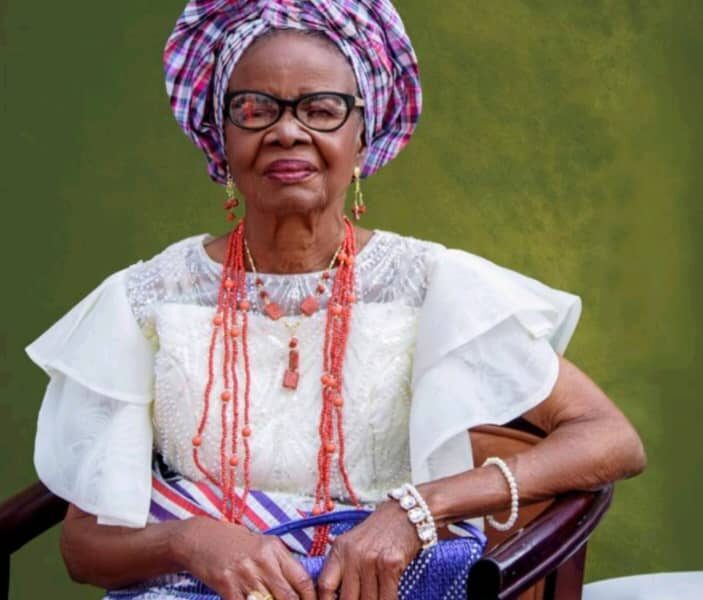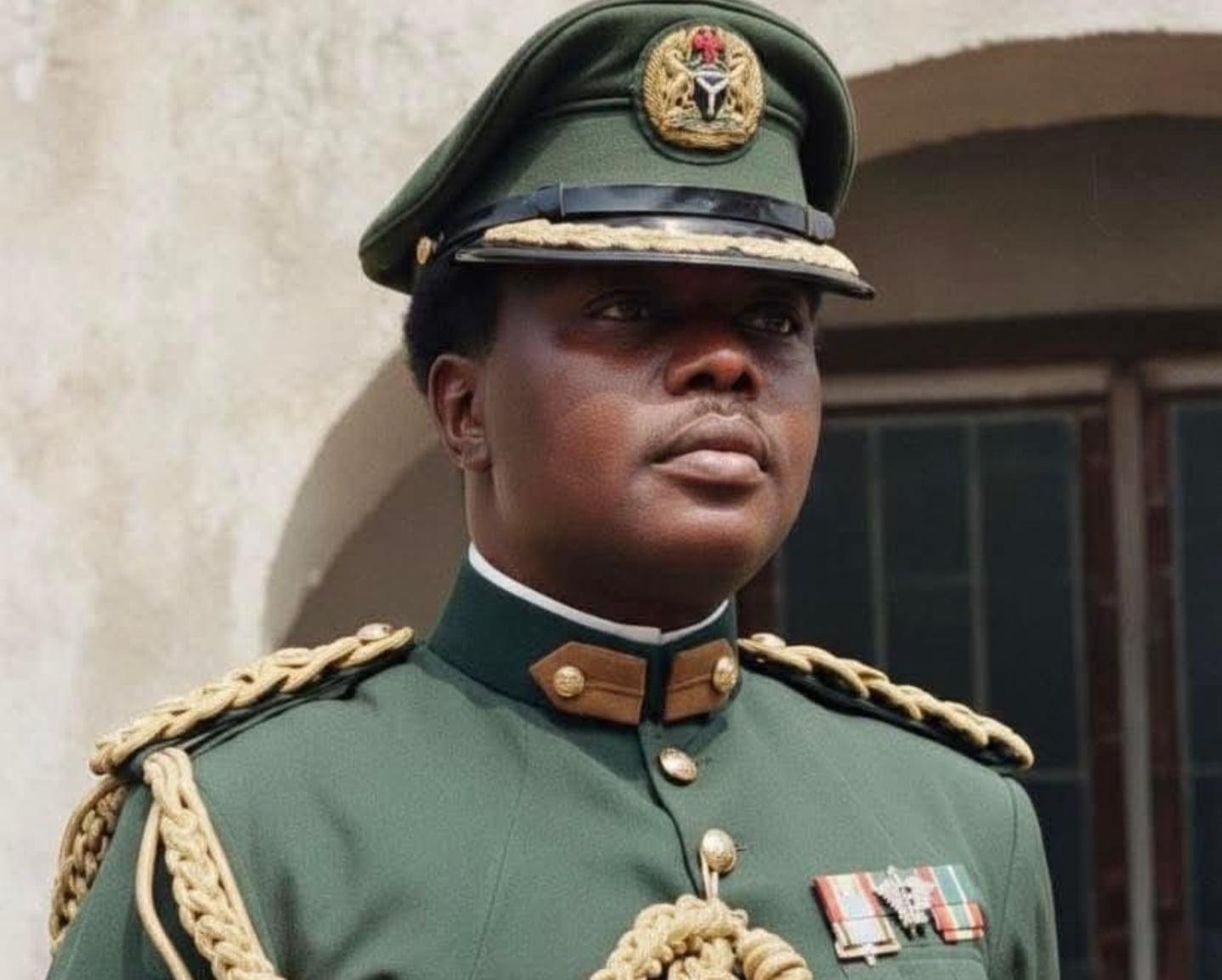By Tunde Olusunle
Just days after the end of the Nigerian Civil War in January 1970, disaster struck in the home of Wikina-Emmah in Kono at the heart of Ogoniland in Rivers State. Ebenezer Saro-Wikina, eldest son of Wikina-Emmah, suddenly passed. The Ogoni were among the nationalities affected by the civil war. Multitudes from the ethnic group previously sought refuge in the area delineated as Biafra by the secessionists. They were glad to return to their ancestral homes at the end of hostilities. Ebenezer Saro-Wikina went through the stress and drudgery of “crossing the Red Sea,” literally.
 He got back to his roots but sadly passed within days. The painfully departed Ebenezer was married to Grace Wikina and together they had five children. The 36-year old Grace Wikina at the time had to confront the grim reality of raising her two sons and three daughters, all by herself.
He got back to his roots but sadly passed within days. The painfully departed Ebenezer was married to Grace Wikina and together they had five children. The 36-year old Grace Wikina at the time had to confront the grim reality of raising her two sons and three daughters, all by herself.
“Mummy,” Mama or “Grandma” as she’s variously addressed, turned 90 on Sunday December 1, 2024. It is a fitting opportunity to celebrate this peculiar yet unsung matriarch. In consonance with her name, “Grace,” Mama has been graced by God, strengthened and preserved especially through the past 56 years, playing father and mother to five children. They have turned out successfully in their separate endeavours before her very eyes. They have also blessed her with numerous grandchildren and great grandchildren. Serial arrivals of newborns have kept Mama delightfully engaged, running the motions of *omugwo* ever so often. She’s eternally available to help with postpartum care for her children and daughters-in-law, after childbirth. This is a cultural practice long popularised by the Igbo nationality of South East Nigeria. It is seems standard Nigerian, maybe African practice though, known by other qualifications.

My classmate, good friend and brother, Blessing Barikui Wikina, one of Mama Wikina’s children it was who engendered the earliest engagements between my family and the Wikinas. Blessing is Mama’s second child behind Bright Wikina. Margaret Keaniabari Wikina; Anita Dorathy Dunubari Mojekwu and Aniekan Baribefe Faith Nnadozie, are Blessing’s siblings from Mama. His half-siblings, Mama’s stepchildren include Nwifii Wikina; Barido Wikina; Sonny Wikina and Ekama Helen Wikina. At the point of registration as a direct entry student at the University of Ilorin in the “harmattan semester” back in 1982, I met a core of like-minded classmates at various registration stops. Those were not the days of the internet or e-learning as yet, where you could enrol for studies online from any part of the world, take your courses via the same medium, write your examinations and also get graded, virtually.
Members of my small circle of freshmen would subsequently share the same hostels, nurture similar extracurricular interests and proceed to become non-biological siblings for life, up till this day. The core of that team featured: Gbenga Ayeni, a professor of journalism at the East Connecticut State University, (ECSU), in the United States; Dapo Adelegan, a hardworking multipreneur and Bisola Segilola Oluwole, a sterling businesswoman. Wikina, who retired as Director from the Rivers State Civil Service, and Folake Obe-Olawuyi, were in the group. Folake was the daughter of the renowned Nigerian photojournalist, Peter Obe, who was on the frontlines of the Nigerian Civil War between 1967 and 1970, documenting the 30-month engagement. Sadly, we lost Folake a few years ago to the COVID-19 scourge early 2021.
My family lived in Ilorin at the time while the families of most of my friends lived elsewhere, in Lagos, Makurdi, Port Harcourt and so on. They adopted our Ilorin abode as theirs and usually stored their belongings in our place whenever it was holiday. During our usual banters, I would rub it in that I was their “guardian” in Ilorin and they were bound to be of good behaviour! It was my self-appointed responsibility to visit the university regularly while they were away, to keep tabs on information beneficial to us all. Hard copies of results of the previous semester’s examinations and similar updates were unfailingly pasted on the noticeboards of various departments and faculties. We had a land-line in our family house so I usually called to brief them.
In the course of one of such checks after our final examinations in 1985, I discovered there was an error of computation in Wikina’s results. This could possibly cost him an additional academic year. The land-line Wikina left with me was malfunctioning. I couldn’t reach him and there was no alternative. I couldn’t contemplate having one of my closest friends repeating a year in university by no fault of his. I discussed the impasse with my parents who of course knew all my friends. I sought their blessings to travel to Port Harcourt, to save my friend from the careless oversight of some non-academic staff. My parents approved and funded my trip. So, off I left for Port Harcourt on my first visit ever, that day in July 1985. I knew the address of the Wikinas by heart, like I did the addresses of everyone else. In our usual, regular exchanges, it was common for us to celebrate the characteristics of our home bases. Lagosians typically pride themselves as the smartest and toughest. I would remind them I was raised in the bristling Benin City, home of daredevil toughies. Wikina serenaded us with salivating stories about Port Harcourt, the idyllic “Garden City.”
So, here I was at No 3, Wogu Street, D’Line, Port Harcourt, home of the Wikinas. I introduced myself to the mother of the house who set aside everything she was doing to receive this friend of her son who she had heard so much about. By this time, neither Blessing nor anyone else knew my mission. I kept asking about Blessing’s whereabouts. Mama did all she could to make me feel at home offering me water and beverages. Blessing finally showed up. You could see the sense of agitation on his face when he came face to face with me. He had gone to play set, a “five-a-side” football variant, popular in the neighbourhoods and institutions of learning. My face was the least he expected to see in Port Harcourt. Ol’ boy, wetin happen na, he queried in apprehension…
Tears streamed down the cheeks of Mama Grace Wikina when Blessing relayed the purpose of my visit to her. Following the 1970 demise of her husband, Mama secured a job in the Rivers State Civil Service. With her meagre earnings she trudged on, focused on raising her children to be disciplined, God-fearing, focused and hardworking. Part of Blessing Wikina’s way of supporting the exertions of his widowed mother was to join the civil service, even before he pursued university education. One could only imagine just how broken Mama would have been if Blessing could not graduate on schedule…
Mama attended the convocation ceremony where Blessing and I graduated with honours in Unilorin, in October 1985. Mama and her small delegation to the event stayed in our house in Ilorin. This further consummated the growing relationship between the Olusunles and the Wikinas. Upon completion of her National Youth Service Corps, (NYSC) in Calabar in 1992, my fiancée at the time, my wife of over three decades now, secured a job with the Port Harcourt branch of CSS Bookshop. I encouraged her to take it so she could begin to build up her work experience. But there was a challenge: accommodation. I called Mama and told her my wife-to-be was in need of a place to stay having just secured a job. “I will vacate my room for her if we cannot find space for her. When is she resuming,” was Mama’s most touching response. My younger sister, Lydia Osasere-Omoruyi got posted to Port Harcourt for the NYSC shortly after my wife moved in. This heightened accommodation concerns at the Wikina’s. Mama the tough matriarch dislodged Blessing from his own room and settled her in!
Years back, Mama Wikina came into Abuja with members of the family for an event. They attempted to “sneak” into a hotel so as “not to bother us.” They were “busted” and happily rerouted to our place, even if it meant we as hosts had to fling duvets and mattresses on the floors of our living rooms within the period of their visit. My son was posted to Rivers State for the NYSC, shortly after this visit. He was received by Blessing Wikina from the Port Harcourt airport and settled in to catch his breath in Blessing’s home for a few days. He was subsequently taken to the NYSC camp in Nonwa-Gbam, in Tai local government area by his host and uncle. Such is the story of the archetypal “handshake across the Niger River,” between the Olusunles of Okunland in the savannahs of Nigeria’s North Central, and the Wikinas of Ogoniland in the wetlands and creeks of the South South. This was the Nigeria we knew, the lost motherland, fittingly bemoaned by the legendary novelist, Nigeria’s own Chinua Achebe in his seminal treatise titled *There Was A Country: A Personal History of Biafra, published in 2012.
The Wikina family has scheduled a thanksgiving service for 10am at Methodist Church, Mbonu Street, D’Line Port Harcourt on Saturday December 7, 2024. This will be followed by a grand reception at The Authograph Event Centre, on Sani Abacha Road, GRA Phase 3, also in Port Harcourt. A grateful Mama Wikina will be surrounded by her siblings, children, stepchildren, their spouses, grandchildren, great-grandchildren and family extensions cultivated over time and geography. We join in praying for good health and more years on earth for a spectacular woman. Congratulations, Mama N’Court, one of Mama’s pet names, which alludes to her being spouse to Ebenezer Saro-Wikina whose father was a colonial era court interpreter.
Tunde Olusunle, PhD, Fellow of the Association of Nigerian Authors, (FANA), teaches Creative Writing at the University of Abuja



